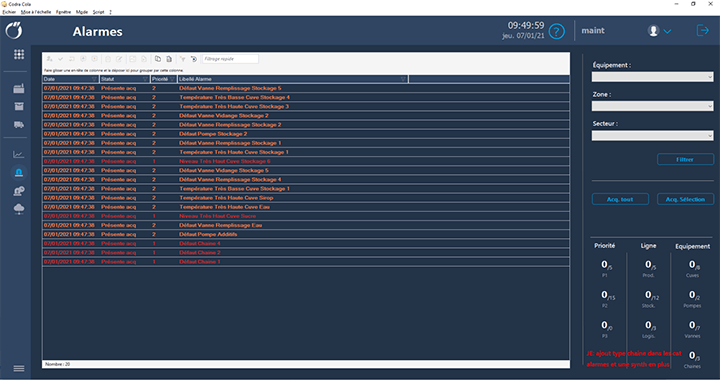Faced with an overload of technical alerts, how can you guarantee effective alarm management without compromising the safety of your installations? It’s important to be aware of practical strategies for prioritising critical alarms, optimising industrial SCADA and avoiding fatigue among on-call teams.
Alarm management systems: foundations and challenges
Alarm management systems monitor technical equipment in real time to detect anomalies. Their role is to transmit alert signals to the right recipients, avoiding unnecessary overload. Panorama E2, a SCADA solution, centralises these alarms while optimising industrial SCADA for rapid decision-making.
An overload of alerts impairs the responsiveness of technical teams. It generates stress, errors and a loss of productivity. Notifications that are too frequent end up being ignored, increasing the risks associated with installations. Effective alarm management must therefore prioritise critical alerts while limiting irrelevant signals to maintain operational efficiency.
Safety issues and continuous monitoring of facilities
By enabling anomalies to be detected immediately, monitoring considerably reduces the risks associated with intrusions, fires, breakdowns or technical failures. A well thought-out alarm management solution does more than simply trigger an alert: it becomes a genuine tool for securing and managing business continuity.
Whether it’s an intruder alarm, a fire alarm, a report of a power failure or a technical fault, each alert must be relevant, prioritised and contextualised. This intelligent filtering avoids unnecessary or redundant alerts, while ensuring that critical signals are handled with the necessary responsiveness. By integrating these mechanisms into an overall monitoring strategy, businesses can enhance their operational security while reducing the mental workload on their on-call teams.
Modern SCADA technologies ensure the protection of critical data and equipment. The security of sensitive buildings relies on the integration of access control and SCADA systems. These intelligent tools filter relevant alerts, enhance overall security and improve incident response through structured management of technical alarms.
Optimising alarm and on-call management
Strategies for prioritising alerts are based on criticality classification and intelligent filtering. Modern systems incorporate machine learning algorithms that assess the risk associated with each alarm. This approach reduces unnecessary downtime and prevents the desensitisation of technical teams faced with an overload of alerts.
Important criteria for configuring a high-performance management system include :
- the introduction of NF A2P certification guaranteeing the reliability of the equipment and recognition by insurance companies;
- video integration for immediate detection and faster response times;
- use of IP transmission with GPRS backup to ensure continuity in the event of network failure;
- choosing APSAD-approved remote surveillance for a professional, structured response to critical alarms.
Analysis of historical data identifies recurring patterns and the root causes of frequent alarms. By cross-referencing this information with performance indicators, the teams adjust alert thresholds and eliminate irrelevant signals. This ongoing process optimises the effectiveness of the alarm management system and strengthens its reliability over the long term.
Advanced software solutions for intelligent management
Modern SCADA software centralises critical alarms and facilitates their processing. Their intuitive interface and advanced functionalities enable optimal management of alerts in real time for technical teams.
Integrating alarm systems with IT and technical tools improves interdepartmental coordination. SCADA systems ensure seamless communication between platforms. Standardised APIs and connectors (TCP/IP, SNMP, HTTP) promote interoperability with existing equipment. This synergy optimises plant SCADA, simplifies preventive maintenance and enhances overall safety thanks to a unified view of industrial processes.
Transmission channels must guarantee rapid and reliable notification of teams. SMS, email and automated calls provide extensive coverage. Secure messaging solutions improve traceability and responsiveness to critical alerts.
The organisation of on-call duty is based on a balanced schedule and clearly defined responsibilities. Automated management tools distribute call-outs according to availability and technical skills.
Effective alarm management involves prioritising critical alerts, using appropriate SCADA software and analysing historical data. These strategies reduce alert overload while enhancing security. By adopting these practices, companies can improve their responsiveness and ensure that their facilities are managed as efficiently as possible.






